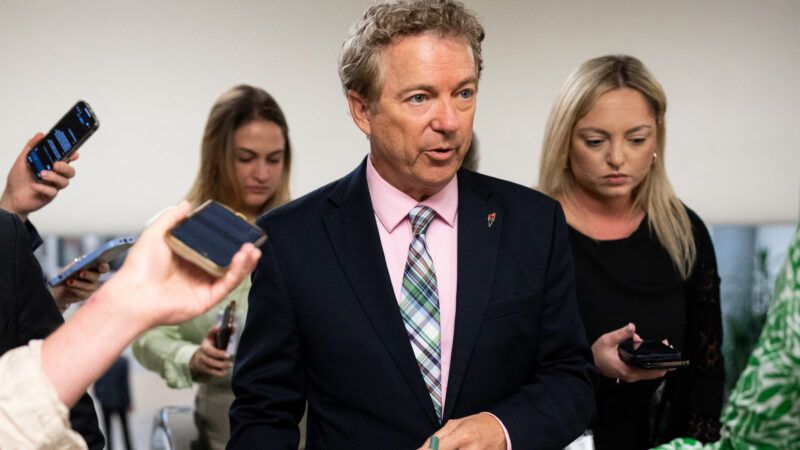Rand Paul Wants DOGE To Build a $500 Billion Rescission Package for Congress To Approve
"The only way you get less waste is to give them less money to spend," says the libertarian-adjacent senator from Kentucky.

Sen. Rand Paul (R–Ky.) is no newcomer to pointing out silly ways that the federal government wastes taxpayer dollars—like the time the National Institutes of Health spent over $300,000 to study whether quails got more frisky after being fed cocaine, which has been a staple of his speeches for years.
So he's pretty thrilled to see the executive branch focused on cutting wasteful spending.
"We've been pointing this out for a decade, but now we finally have an administration that's interested in it—they are canceling contracts, locking doors, firing people. There really is this disrupting force, and that's good," Paul told Reason in an interview on Wednesday.
Nearly a month after President Donald Trump returned to office and unleashed Elon Musk's Department of Government Efficiency (DOGE) on the administrative state, Paul says DOGE is "doing a great job," and he's looking forward to making some of those changes permanent.
Doing that will require a few additional steps.
"If we want to have real savings, they're going to have to send this back to Congress, and Congress is going to have to approve of spending less money," Paul said.
During a weekly meeting of Republican senators earlier on Wednesday, Paul encouraged Vice President J.D. Vance to have the Trump administration draw up a rescission package: a special type of bill that formally withdraws spending Congress had previously authorized. That would allow Congress to make the DOGE spending cuts stick. Even better, a rescission bill can pass the Senate with a simple majority, and Paul believes there would be enough support (even though a similar maneuver failed during the first Trump administration).
"I'd love to see a $500 billion rescission package," Paul said. "The Republicans right now in the Senate are actually agitating to increase spending. I'd much rather be voting on a bill to reduce spending than increase spending."
A vote on a rescission bill would solve some of the legal and procedural questions about DOGE's spending cuts. Under the terms of the Congressional Budget Control and Impoundment Act of 1974, which undergirds the entire modern federal budgetary process, presidents are not allowed to simply refuse to spend money that Congress has appropriated.
Russ Vought, the White House's budget director, believes that law is unconstitutional and is seeking to challenge the limits it places on presidential control over spending. That potentially messy fight could be avoided if Congress gives its approval to rescind the spending DOGE wants to cut.
Meanwhile, Paul shrugged off another criticism of DOGE's efforts so far: that trimming a few billion from the federal budget is insignificant in the face of a nearly $7 trillion federal budget.
"Why would we still not start with the most egregious stuff and get rid of it?" said Paul. "Ultimately, how do you get to better spending? You get better people in government, or you give them less money. I don't think we can really expect to get better people, less bureaucrats in government….The only way you get less waste is to give them less money to spend."


Show Comments (66)